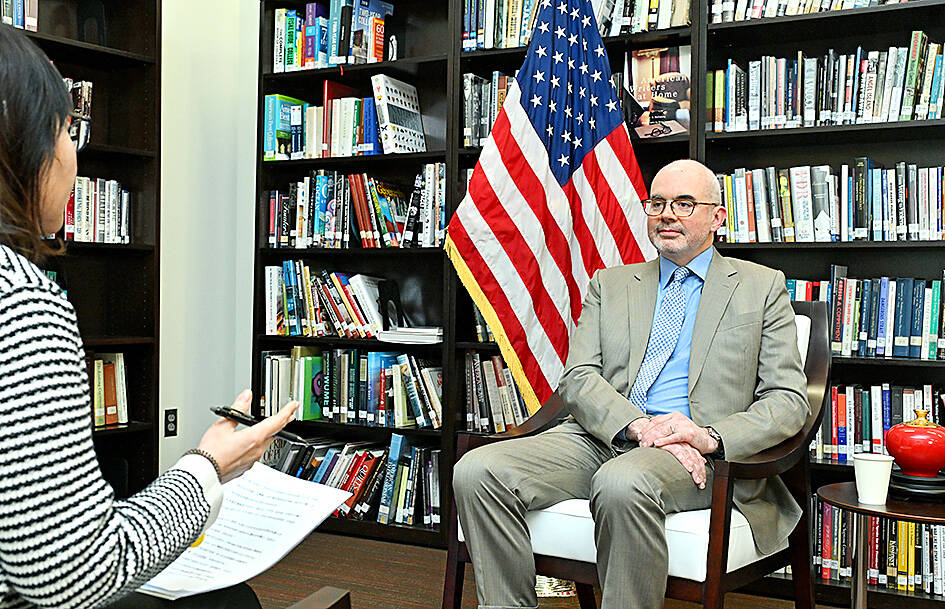The Taiwan-US relationship in the semiconductor sector is not a “zero-sum” game, but a “positive-sum” one, American Institute in Taiwan (AIT) Director Raymond Greene said, adding that the US and Taiwan have an unbreakable partnership.
Greene made the remarks in an exclusive interview with the Liberty Times (sister paper of the Taipei Times) on Friday, which was published in the Chinese-language newspaper yesterday.
Taiwan Semiconductor Manufacturing Co (TSMC) last week announced that it would invest US$100 billion to establish three new chip fabs, two advanced packaging plants and a research and development center in Arizona.

Photo: Cheng I-hwa, AFP
However, the announcement has sparked concerns among some Taiwanese that it could reduce US strategic interest in ensuring security across the Taiwan Strait.
Greene said the move is a positive development not only for Taiwan-US relations, but also for TSMC and its customers, as most of its major customers are in the US.
“I think this business decision will benefit both of our economies,” he said, adding that it also reflects the growing closeness between Taiwan’s and the US’ semiconductor sectors.

Photo: Tien Yu-hua, Taipei Times
TSMC’s decision is also driven by the growing demand for semiconductors, and with the introduction of artificial intelligence (AI) technologies, semiconductor demand is expected to expand indefinitely, Greene said.
While TSMC continues to build new factories across Taiwan, the nation has natural constraints, including limited land, water, workforce and energy resources.
Therefore, much like its investments in Japan and Germany, TSMC sees Arizona as a strategic choice to meet customer demand, given the US’ advanced technology ecosystem, Greene said, adding that Arizona also aligns with TSMC’s goal of expanding its facilities wherever possible.
“I think TSMC chief executive officer C.C. Wei [魏哲家] and President William Lai [賴清德] made some very important points about how this will benefit our development of a closer supply chain relationship,” he said.
“The US and Taiwan relationship in the semiconductor sector isn’t a zero-sum game, but a positive-sum relationship,” he added.
Taiwan would remain home to the world’s most efficient and advanced semiconductor ecosystem, which is why US companies such as Corning and Micron choose to invest and conduct research and development here, he said.
Similarly, the US is home to some of the world’s top chip designers, many of whom collaborate closely with TSMC. It also offers key advantages for production investment, including low-cost energy, a favorable business environment and access to the world’s largest consumer market, he added.
“In the semiconductor sector especially, the US and Taiwan share an unbreakable partnership,” Greene said.
Addressing the rise of the “America skepticism” theory in Taiwan following US President Donald Trump’s return to the White House, the AIT director urged skeptics to take a broader view.
“I would say to people who question to step back and look at what a strong partnership the US and Taiwan has, and how important Taiwan is, not only to the US, but the entire world,” he said.
Quoting US Secretary of State Marco Rubio, Greene said that the US’ commitments to Taiwan have remained consistent across multiple administrations, including during Trump’s first term.
“One of the reasons that it has been so consistent is because it is based on the law — the Taiwan Relations Act, and it also enjoys strong bipartisan support in Congress,” he said.
“But I also think its important to consider just how deep US interest in Taiwan are,” Greene said.
Taiwan is the US’s seventh-largest trading partner, with trade exceeding that of the 1.4 billion people in India and even surpassing trade with G7 nations such as the UK, France and Italy. This highlights the depth and mutual benefits of the US-Taiwan economic relationship, he added.
About 90 percent of US companies plan to maintain or expand their investments in Taiwan, recognizing it as a key partner with the critical technology needed to win the competition of the 21st century, particularly in advanced technology and manufacturing, he said.
“US-Taiwan relations have a very strong basis, not only in terms of values or history, but also in terms of shared interests,” he said.
Green said that one of the Trump administration’s most notable achievements is its swift reaffirmation of key alliances. This included meetings with Japanese Prime Minister Shigeru Ishiba, the trilateral US-Japan-South Korea foreign ministers’ meeting and joint statements emphasizing their commitment to peace and security in the Taiwan Strait
The administration has also stated its opposition to any attempts to change the “status quo” across the Taiwan Strait through force or coercion, he said, adding that the international community’s recognition of Taiwan’s importance is also a stabilizing factor in the cross-strait relations.
Last week, the AIT held a Global Cooperation and Training Framework session on Taiwan’s whole-of-society resilience, which brought representatives from more than 30 countries to Taiwan to talk about how they can enhance collaboration in these critical areas, Greene said.
“I think everyone realizes that if there is any conflict or crisis in the Taiwan Strait, everybody in the world would be impacted. Conservative estimates say that the damage from a cross-strait conflict could cost up to 10 percent of global GDP,” he said.

A Taiwanese software developer has created a generative artificial intelligence (AI) model to help people use AI without exposing sensitive data, project head Huang Chung-hsiao (黃崇校) said yesterday. Huang, a 55-year-old coder leading a US-based team, said that concerns over data privacy and security in popular generative AIs such as ChatGPT and DeepSeek motivated him to develop a personal AI assistant named “Mei.” One of the biggest security flaws with cloud-based algorithms is that users are required to hand over personal information to access the service, giving developers the opportunity to mine user data, he said. For this reason, many government agencies and

The National Fire Agency on Thursday said a series of drills simulating a magnitude 8.5 earthquake would be held in September to enhance the government’s emergency response capabilities. Since earthquakes cannot be predicted, only by continuously promoting disaster prevention measures could Taiwan enhance its resilience to earthquakes, agency Director-General Hsiao Huan-chang (蕭煥章) said in a news release. The exercises would be held to mark annual National Disaster Prevention Day on Sept. 21, the aim of which is to test Taiwan’s preparedness and improve its earthquake resilience in case of a major temblor, Hsiao said. As part of those drills, an earthquake alert would

DEFENSE: The National Security Bureau promised to expand communication and intelligence cooperation with global partners and enhance its strategic analytical skills China has not only increased military exercises and “gray zone” tactics against Taiwan this year, but also continues to recruit military personnel for espionage, the National Security Bureau (NSB) said yesterday in a report to the Legislative Yuan. The bureau submitted the report ahead of NSB Director-General Tsai Ming-yen’s (蔡明彥) appearance before the Foreign and National Defense Committee today. Last year, the Chinese People’s Liberation Army (PLA) conducted “Joint Sword-2024A and B” military exercises targeting Taiwan and carried out 40 combat readiness patrols, the bureau said. In addition, Chinese military aircraft entered Taiwan’s airspace 3,070 times last year, up about

STRICTER ENFORCEMENT: Taipei authorities warned against drunk cycling after a sharp rise in riding under the influence, urging greater public awareness of its illegality Taipei authorities have issued a public warning urging people not to ride bicycles after consuming alcohol, following a sharp rise in riding under the influence (DUI) cases involving bicycles. Five hundred and seven people were charged with DUI last year while riding YouBikes, personal bicycles, or other self-propelled two-wheelers — a fourfold increase from the previous year, data released by the Taipei Police Department’s Traffic Division showed. Of these, 33 cases were considered severe enough to be prosecuted under “offenses against public safety,” the data showed. Under the Road Traffic Management and Penalty Act (道路交通管理處罰條例), bicycles — including YouBikes and other